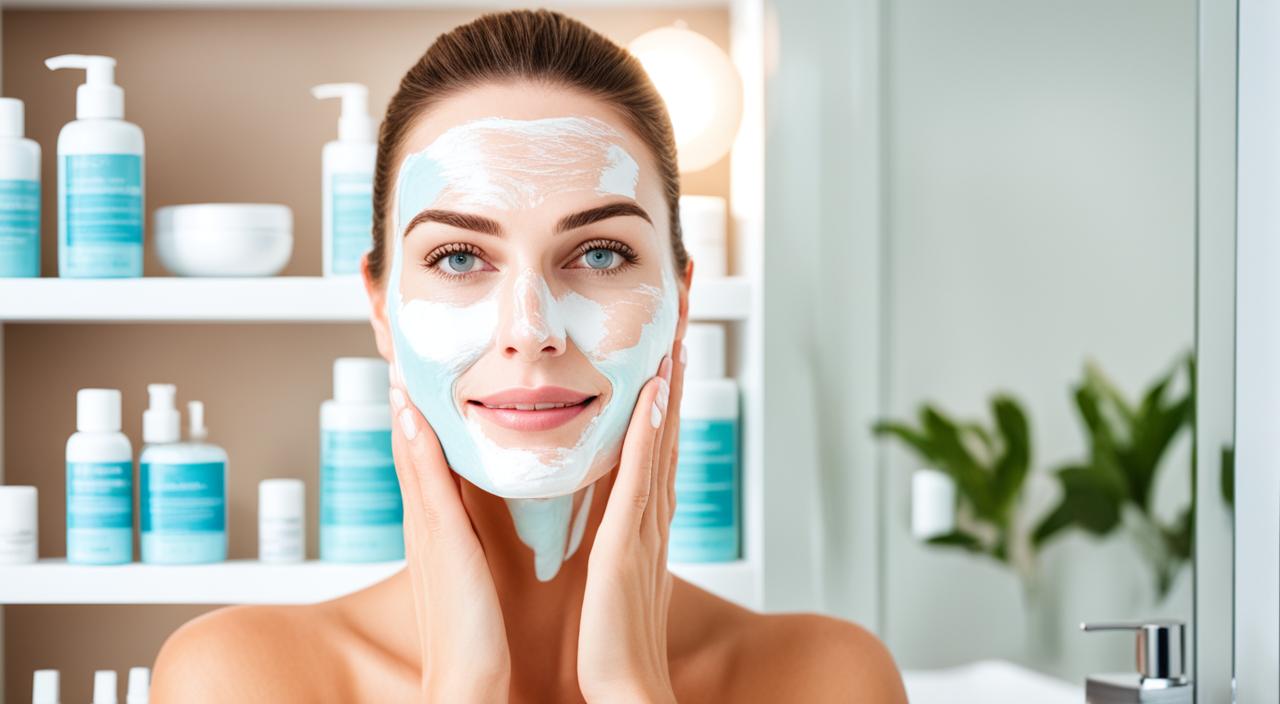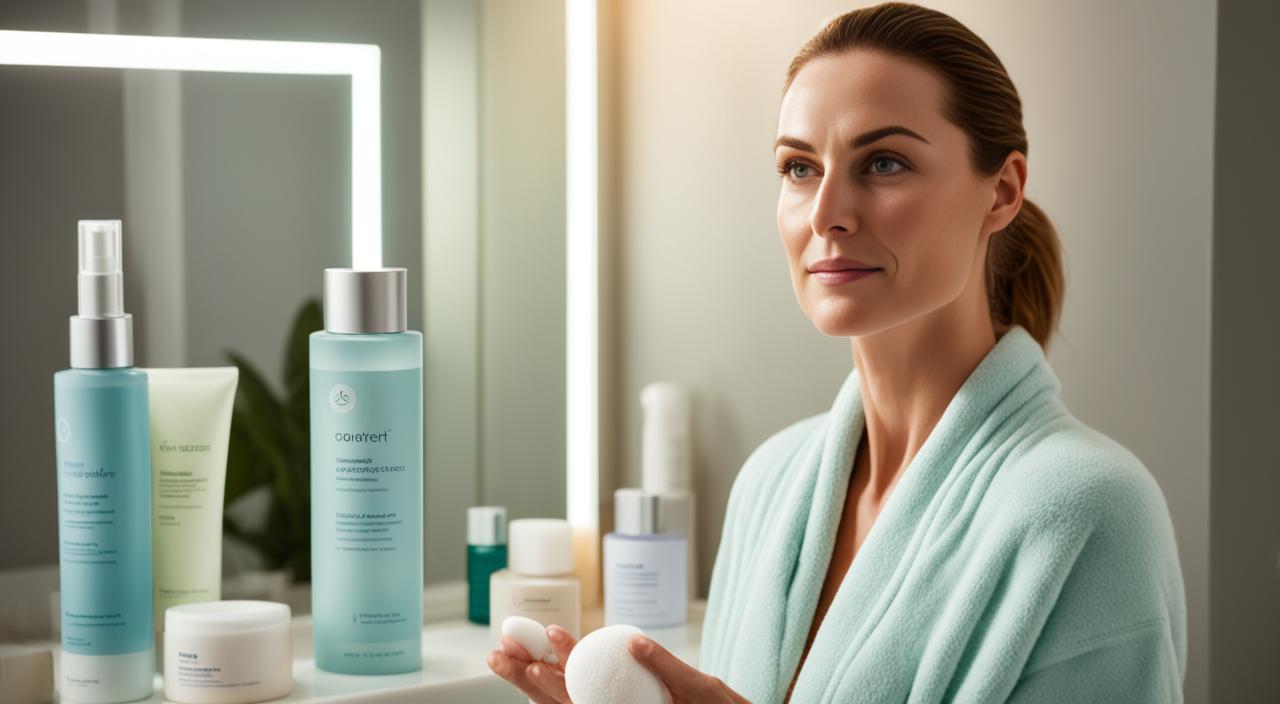My 5 Step Great Skin Care Routine That Gets Rid of Acne

Skin Care Routine That Gets Rid of Acne:-Acne can be one of the most frustrating skin problems to deal with, especially when it directly impacts your confidence. Whether you have mild or severe acne,
maintaining a strong skin care routine is crucial in keeping breakouts at bay. A good skincare routine is something that should never take a backseat.
In fact, following an intentional and consistent routine will help strengthen your natural defense against pimples not to mention keep you looking fresh and stress-proof.
Activating our five senses when creating a skincare routine is important because it helps us remember the steps we need to take every day to keep our skin healthy from the inside out.
Skin Care Routine That Gets Rid of Acne
1) Morning Skin Care Routine
The first step to getting clear and glowing skin is cleansing. Cleansing removes dirt, grime, and excess oil from your skin’s surface, promotes circulation, and prepares your skin for the rest of your skincare products.
Our skin naturally sheds itself every 28 days, but excess oil and dirt can cause it to shed prematurely, causing acne.
Try using an oil-free, non-comedogenic cleanser for acne-prone skin, like our Mosaic. Many acne products contain benzoyl peroxide (BPO).
BPO is a common ingredient found in acne products designed to kill acne-causing bacteria. Research has shown that BPO can be irritating when used daily,
which is why it’s best to use it only two or three times a week. BPO should always be used in moderation.

2) Evening Skin Care Routine
Evening skin care is all about moisturizing. The last step in your daily skin care routine should be applying a moisturizer that’s rich in antioxidants, like Vitamin C.
Applying Vitamin C to your skin at night can help neutralize free radicals, prevent premature aging, and reduce the appearance of wrinkles. If you have oily or acne-prone skin, we recommend using an oil-free moisturizer. Oily skin types produce more sebum, which can clog your pores if it’s not controlled.
Choosing a moisturizer with oil-absorbing properties can help refine your skin’s texture while keeping your pores clean. For dry skin types, a rich moisturizer can help hydrate and nourish dry patches.
Be sure to apply a light, non-greasy moisturizer to avoid clogging your pores.
3) Weekly Rituals
Exfoliation is a skincare practice that many don’t incorporate into their daily skin care routine. However, exfoliating your skin is an important part of treating acne-prone skin. Exfoliation is done with a gentle,
chemical-free face scrub that scrubs away dead skin cells that have built up on your face. Doing this helps keep pores clean and clear, preventing blackheads and whiteheads from forming.
Moisturizing is another important skincare ritual to keep your skin hydrated and acne-free year-round. Depending on your skin type, you may need more or less moisturizing.
Dry skin types can benefit from a moisturizing face mask once a week. We recommend using a face mask made with hydrating ingredients like aloe vera, rose water, and egg white protein. When applied, a face mask can help moisturize and treat acne-prone skin.
4) Occasional Treatments
The occasional treatment can help keep acne at bay. Acne spot treatments are designed to reduce breakouts by targeting and killing acne-causing bacteria, while benzoyl peroxide and salicylic acid are the most common ingredients found in acne spot treatments.
Retinoids are also a great addition to any skin care routine. This class of skin care products is designed to stimulate collagen production, which can help reduce the appearance of acne scars and wrinkles.
Retinoids come in different forms, such as gels, creams, and serums. If you want to treat your acne from the inside out, you can use supplements like zinc, fish oil, and Vitamin B.
These supplements can help keep your skin healthy and balanced.

5) Exfoliation Isn’t Just For Cleansing
Exfoliation isn’t just for cleansing. It also helps clear out clogged pores, remove dead skin cells, and unclog blackheads and whiteheads.
Using a chemical-free exfoliator helps control your skin’s oils and sheds away dead skin cells. We recommend using a chemical-free exfoliator once or twice a week.
If you have acne-prone skin, you might want to avoid exfoliating too frequently, as it can irritate your skin. Mild exfoliators are great alternatives to chemical-free scrubs.
A mild exfoliant like our Mosaic Exfoliator only contains gentle ingredients like aloe vera, oat extract, and jojoba oil.
Also Refer:-Skincare Problems and The Solutions
Bottom line
Follow a consistent skin care routine, and you’ll notice positive changes in your skin’s texture, tone, and overall appearance.
You can treat acne with a combination of skincare products, as well as diet and lifestyle changes.
If you’re struggling with acne or have tried several different skincare regimens without seeing results, it’s time to consult a dermatologist.
A dermatologist can help you determine what’s causing your acne, and will be able to recommend the best acne treatment for your unique skin type.






